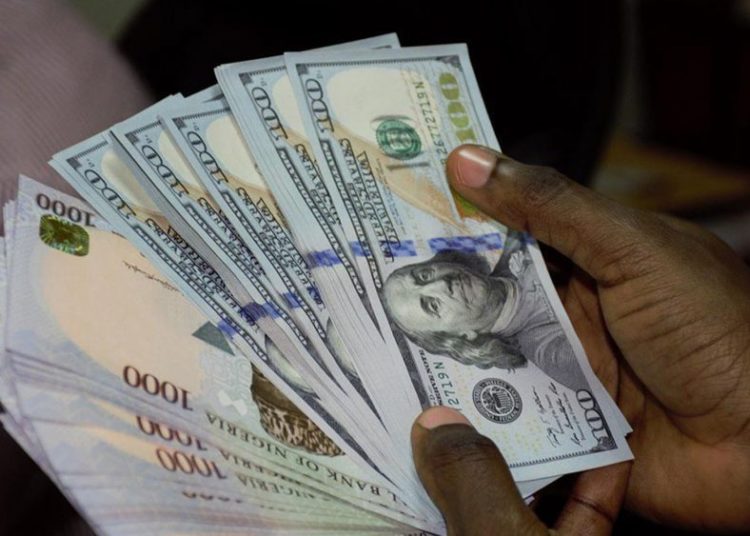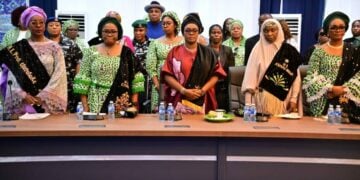Economists and industry stakeholders have offered divergent views on how to halt the slide of the Naira against the United States dollar, with most of them suggesting that the most practical solution is for the country to improve crude oil production to improve foreign exchange earnings.
At the close of business last week, the value of the naira closed at N1,360 to the dollar at the parallel market and N909.45 at the official window.
Dollar inflow into the country had been on the decline since last year with the data from FMDQ (a financial market infrastructure group) showing that total inflows into the Nigerian Autonomous Foreign Exchange Market (NAFEM) declined by 4 per cent month-on-month in December 2023 to $1.37 billion as against $1.43 billion recorded in November 2023.
The breakdown provided showed a broad-based decline across the local and foreign sources which account for 82.7 and 17.3 per cents respectively. Expressly, local inflows declined by 2.6 per cent to $1.13 billion compared to $1.16 billion recorded in November, primarily due to weaker inflows from exporters that declined by 15.4 per cent.
Similarly, inflows from foreign sources remained underwhelming, declining further by 9.9 per cent to $237.10 million as against the November figure of $263.20 million as foreign investors remained cautious about returning in droves following Nigeria’s foreign exchange market inadequacies.
Overall, the total inflow into the NAFEM window averaged $1.17 billion in 2023 compared to the 2022 average of $1.24 billion.
The continued shortage of dollar inflow into the country has made the value of the naira to depreciate at the parallel market as the value also dipped at the official end of the market.
While some economists have identified the failure to diversify the economy, which has left the national oil company as the major source of foreign currency, others insist the current challenges in managing the local currency are as a result of government borrowings through CBN’s Ways and Means.
The Nigerian National Petroleum Company Limited (NNPC) recently borrowed $3.3bn on behalf of the federal government to meet its obligations. And while the government and some economists are looking towards the NNPC to mitigate the shortage of foreign currencies, the group chief executive officer of the NNPC Ltd, Mr Mele Kyari, insists that the company is not withholding public funds.
Kyari who during a visit of the Extractive Industries Transparency Initiative (EITI) to his office in Abuja on Thursday, was responding to a report by the Nigeria Extractive Industries Transparency Initiative (NEITI) that the NNPC failed to remit some monies into the Federation Account.
Kyari expressed disappointment that NEITI went public with its report instead of seeking clarification.
He explained that NNPC Ltd was holding no public funds back and that what NEITI reported as non-remittance was what was due to the company as payment for taking the burden of fuel subsidy on behalf of the federal government.
He disclosed that NNPC Ltd would have released its Audited Financial Statement (AFS) for 2022 in June 2023 but could not do so because it had no substantive Board of Directors at that time, adding that the AFS will be published on the company’s website in the next few days.
According to a statement by chief corporate communications officer of NNPC Ltd, Olufemi Soneye, EITI’s deputy executive director, Bady Baldé, who led the EITI delegation to NNPC scored the company high in its latest global assessment.
Baldé said only Equinox of Norway fared better than NNPC Ltd in the assessment among companies in the same category.
He, however, said there was still room for NNPC Ltd to improve, stressing that compliance with global EITI standards would help boost the company’s credibility.
The EITI boss also urged NNPC Ltd to remain engaged to play an active role in its Nigerian unit, the Nigeria Extractive Industries Transparency Initiative (NEITI).
On his part, the executive secretary of NEITI, Dr Orji Ogbonnaya Orji, called for the reconstitution of the NNPC/NEITI Joint Committee on Reconciliation, stressing that the committee could help in straightening out any grey areas.
On the continued weakening of the Naira, Prof Godwin Owoh, the executive chairman of the Society of Analytical Economics, Nigeria, does not believe the answers lie with the NNPC or the oil industry for that matter.
Prof Owoh, in an interview with LEADERSHIP Sunday said the government needs to stop borrowing through the Ways and Means as it is the major reason why the value of the Naira is plummeting.
He said it is leading to a rise in inflation and as expected, the exchange rate and the interest rate will go in the same direction.
He also raised serious questions about the inflation figures being released by the Nigeria Bureau of Statistics, believing that they are inaccurate and challenging anymore to go to the market and see if they match reality.
Considering the pressure that the Naira is under, Owoh says the true inflation rate is much higher than what the NBS is reporting and they know it.
Prof Owoh dismissed the suggestion that the government needs to borrow to complete infrastructure projects, saying it must cut its cost according to its cloth.
The managing director of Afrinvest Securities Limited, Ayodeji Ebo, however, advised the government to raise foreign exchange from the international market in order to stabilise the currency.
According to him, the government should stop oil theft and ensure an increase in the barrel of daily crude oil production.
“Naira will achieve its value before year end but it depends on the move that is made or how policies are managed. Government should increase supply and if that is properly managed, the naira will appreciate.
“Also, we need to access the international market for loans. For instance, in 2021, the government raised about $5.2 billion and we need that type of intervention again. We need to stop oil theft to increase supply. If these two are done, the naira will be strengthened in the short term while in the long term, we need to focus on non-oil export.”
Importantly, the government should stop oil theft and increase production to 1.8m barrels per day to increase FX supply while we access the international market to raise other structures. Before naira can stabilise, the country needs over $ in the economy and as crude oil continues to provide a steady inflow, we need to work on long term non oil export,” he stated.
Also speaking with LEADERSHIP Sunday on the fate of the Naira, the founder of Cowry Asset Management Limited, Johnson Chukwu, said though Dangote Refinery will reduce pressure on the foreign exchange, the impact would only be felt if there’s an increase in crude production.
“If the refineries – Dangote, Port Harcourt – come on stream, they will reduce our export of crude and unless we have an increase in crude production, any allocation to local refineries will reduce the amount we make from crude sales.
“In the first place, bear in mind that the country’s foreign exchange earnings are from crude and importation of fuel accounts for 30 percent of our total import. So, if the refineries come on stream, it will reduce our export of crude and unless we have increase in crude production, any allocation to local refinery will reduce the amount we make from crude sales.
“So, we have to increase crude production because whatever is going to local refineries will be from the increment and not from the existing 1.3 or 1.4 million barrels we produce daily because if we don’t do that, it simply means what we save from fuel import would be lost to export earnings from crude.”
“However, whatever crude allocated to Dangote and Port Harcourt should be from incremental crude production so that we can maintain our current export earnings and reduce the 30 percent spent on imports,” he said.
Another analyst, Kingsley Chinda, said the 650,000 barrel per day Dangote Refinery is expected to meet 100 percent of Nigeria’s demand for refined petroleum products and generate foreign exchange earnings for Nigeria by exporting 40 percent of its products.
According to Chinda, by producing enough petrol, diesel, jet fuel and kerosene for domestic consumption, the refinery will reduce the need for Nigeria to import products from outside the country and this would lower the demand for dollars and ease the pressure on the naira exchange rate.
“Nigeria’s significant expenditure on fuel imports puts pressure on the demand for foreign currencies, particularly the dollar. By reducing or eliminating the need for fuel imports through the Dangote Refinery’s production, it would reduce the demand for dollars in the importation of fuel. This decreased demand for foreign currency can help strengthen the Naira against the dollar.
“The establishment of the Dangote Refinery will not only contribute to reducing imported inflation and associated costs but also has the potential to attract foreign investments, further bolstering exchange rate stability.
“The presence of a significant refinery indicates Nigeria’s commitment to developing its domestic refining capacity, which can instil confidence in international investors. The refinery’s scale and strategic importance in the oil and gas sector can make Nigeria an attractive investment destination.
“The increased foreign direct investment brings in foreign currency inflows, which can strengthen the country’s foreign exchange reserves and positively impact the exchange rate. Foreign investments not only provide financial stability but also bring expertise, technology, and best practices, further enhancing the refinery’s operations and the overall economy,” he added.
“This combination of reduced imported inflation and the attraction of foreign investments positions the Dangote Refinery as a catalyst for exchange rate stability and economic growth in Nigeria,” he pointed out.
Commenting, Head of Banking at Agusto & Co, Ayokunle Olubunmi noted that, the supply of dollars into the Nigerian economy has dropped thus, the value of the naira continues to depreciate.
According to him, one of the major things that is constraining the supply of dollars is the matured forex forward obligations of the country.
“Not being able to meet the obligations of matured forwards is a disincentive for foreign investors. Also, don’t forget that their money has been trapped in the country twice in less than 10 years. What the CBN and the government, by extension, needs to do is to try and increase dollar supply. That is why the CBN has been trying hard to meet matured forward obligations once they get any inflow as well as that of the airlines. Although some say it is too small, they have been trying to clear the backlogs.
“There are some policies that they have put in place but none of them can work until the backlog is cleared because you can’t tell people to bring in money when you have not even paid the matured obligations. So, meeting those obligations comes first then they need to look at how they can ensure that anyone that brings in money can take their money out at any time,” he pointed out.
Former minister of Industry, Trade and Investment, Mr Olusegun Aganga recently said that the Naira would continue to be weak if Nigeria remains an import-dependent country.
“History has shown that industry multiplies national wealth, creates jobs, is critical for exchange rate and balance of payment management and would make the Naira stronger. What is the wisdom in spending billions defending the Naira when it continues to fall instead of investing in genuine manufacturers and exporters of high-value products that would earn Nigeria foreign income and more?
“After all, we know that the Naira will continue to be weak if Nigeria remains an import-dependent country and does not produce for local consumption and more importantly for export. Unlike the trillions spent on subsidies, bailouts, the Agric Anchor Borrowers programme, the refineries, I can assure that every Naira, no matter how large, that is well spent on strategic industrial sector can be easily recovered and well deliver tremendous benefits to the economy and the nation,” he stated.
The president of Lagos Chamber of Commerce and Industry (LCCI), Dr Michael Olawale–Cole commended the President Bola Tinubu-led administration for yielding to the cry of Nigerians to resolve the protracted challenges of foreign exchange in the country that were deep rooted in the weak productive base of the income which has fundamentally stifled productivity, undermined investment, and disrupted foreign earning sources.
“The rising demand for import items including food commodities, continues to put pressure on the demand for greenback,” he said, adding that “the recent exchange rate policy has closed the gap or spread between the official and parallel market.
“Over a decade, the policy inconsistency of the apex bank undermined supply of FX (Foreign Portfolio Investment is shrinking significantly), with the ripple effect of reducing the confidence in the Naira as a store of value.





